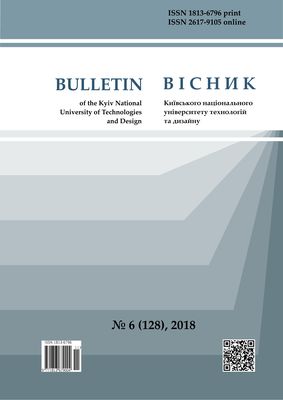INVESTIGATION OF THE PROPERTIES OF STYRENE-ACRYLIC POLYMER MATRIX TO CREATE A COATING ON COTTON KNITTED FABRIC
DOI:
https://doi.org/10.30857/1813-6796.2018.6.4Keywords:
styrene-acrylic dispersion, polymer film, sol-gel method, hydrolytic stability, cotton knitted fabric, hygienic propertiesAbstract
The goal of the work was to study the physico-chemical properties of styrene-acrylic polymer film to form a coating on a textile material. Methodology. A water dispersion of a styrene-acrylic copolymer was used as an object of study.Standardized methods for studying the indicators of the physicochemical properties of polymer films and physical properties of textile materials have been applied. The study of the structural parameters of an individual polymer film was carried out using the sol-gel method. The physical properties of the studied polymer material were evaluated according to the results of the resistance of the film to hydrolytic degradation at different processing temperatures and the effects of soap and soda solution. The quality of
cotton knitted fabric with the formed polymer coating was evaluated by the change in hygroscopicity and breathability. The paper presents the results of a study of the structural and physical properties of polymer film based on the styrene-acrylic copolymer. The optimal polymer composition was determined to create a coating on the textile material and the concentration of the proposed composition was established, at which the hygienic properties of the cotton knitted fabric did not deteriorate. Originality. It is proved that the proposed polymer composition allows you to create a resistant coating on cotton knitted fabric and at the same time keeps hygroscopicity and breathability of knitted сloth. Practical value. The results of the experiment are of practical importance for the development of new finishing compositions for textile materials.
Downloads
Download data is not yet available.
Downloads
Published
2019-04-09
Issue
Section
Materials Science. Textile and Apparel Manufacturing

